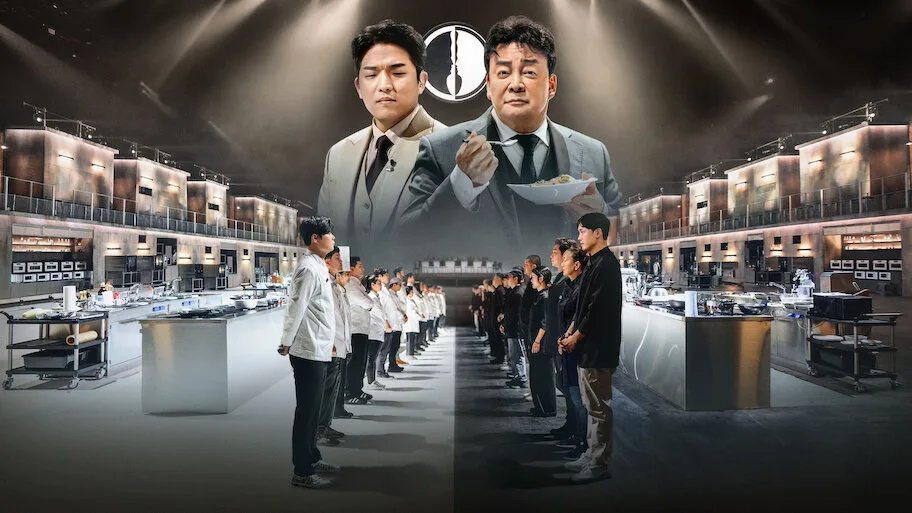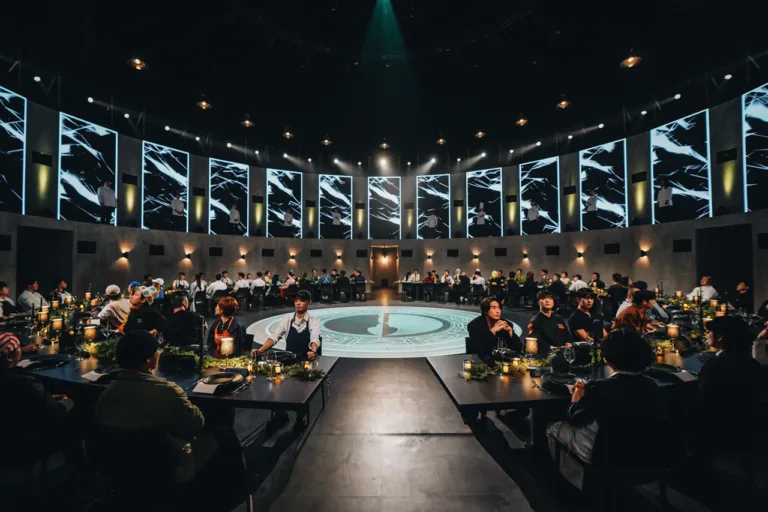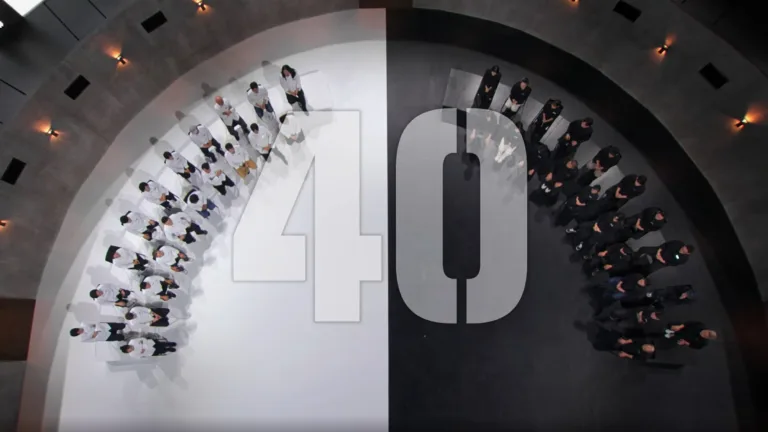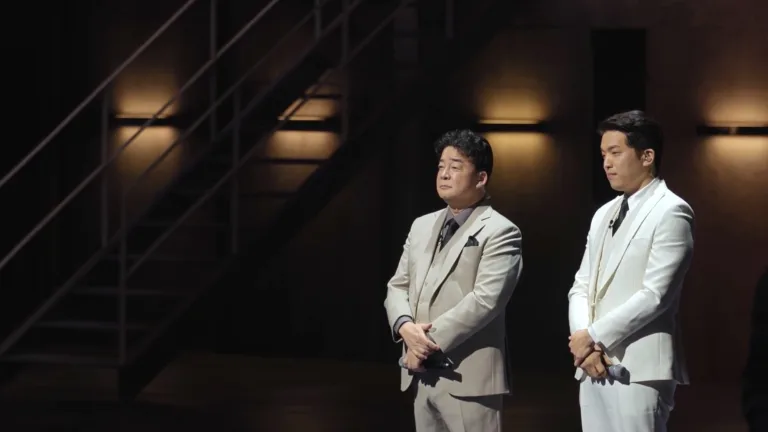
Series
Culinary Class Wars | Netflix Series Review

Rating: 4.3/5
Introduction
100 rising chefs hoping to make a name for themselves, and 20 well-known culinary masters who have already carved their way in the industry, all joined one intense competition: Culinary Class Wars. It’s more than just cooking and creating – it’s about passion, pressure, and perseverance in every dish. From their own signature plates to bold fusion creations, each chef stepped up, not just to impress, but to prove they belong – that their years of experience deserve to be seen. This is where dreams are tested, where national identity is expressed through flavor, and where legacies are born.
Watching this wasn’t exactly on my bucket list. I was just bored, looking for something – anything – to spend my free time with. I didn’t even know who the chefs were. But somehow, I found myself wanting to know more about them through their dishes. Their artistry, the way their experience and emotions spoke louder with every plate – caught me off guard in the best possible way.
As someone who enjoys cooking and simply loves food, this show hit differently. Their plates weren’t just meals; they were stories. And somehow, without realizing it, I started rooting for them, feeling inspired by them. Culinary Class Wars wasn’t just a surprise watch — it became a reminder of why I fell in love with food, and how much joy I find in cooking.
So here I am, writing about this chaotic, inspiring, and flavor-packed journey that deserves to be talked about.
Overview

Screenshot from Culinary Class Wars, available on Netflix.
Culinary Class Wars features black spoon chefs and white spoon chefs, each bringing years of experience to the table. The competition begins with 100 black spoon chefs fighting their way for a spot in the Top 20. And even though this is my first time watching a cooking show, this is where the pressure starts to set in. It’s the point where we, the audience, really start to see each chef’s personality, style, and passion come through in the way they cook. Judged by Paik Jong-won and Anh Sung-jae, the chefs struggled to meet each judge’s standard, especially with how differently the two approach judging.
Once the top 20 are chosen, they are faced against 20 white spoon chefs, chefs who are already known, respected, and established in the culinary industry.
As the competition moves forward, the challenges get tougher as well. I’m pretty sure it’s not just about cooking a good dish anymore, it’s about making something that means something. Something that would hook the judges, represent who they are, and proves they’re not just a chef, but an entrepreneur too.
What sets this show apart is how it draws a clear line between the black spoon and white spoon chefs. Even though black spoon chefs are successful in their own way, there’s a gap they’re trying to close – a level of recognition and status that the white spoon chefs already have. That class division is strongly shown early on in the series and lingers throughout each round as I finish the series.
The show runs for 12 episodes, each around 55 minutes long. And by the end of it, I had way too many feelings. The chefs, the food, the judges, everything about this show pushed me to write, to reflect, and to vent it all right here.
The Competitors

Screenshot from Culinary Class Wars, available on Netflix.
100 black spoon chefs were introduced right in the first episode, and what I appreciated most was how the show gave us a glimpse into who they are—not just as chefs, but as people as well. I got to learn about their background, what cuisine they focus on, the dishes they’re best at, and even how they ended up cooking in the first place. Some were self-taught, some didn’t even plan to be chefs. There were small restaurant owners, company chefs, those with formal training, and even some who already have a bit of celebrity status. Knowing their stories helped me continue watching the series. So when the white spoon chefs were finally introduced, I couldn’t help but wonder how these black spoon chefs would go against them, especially those without formal culinary education. Could they really go against chefs with years of experience, broader exposure, and simply more skills than them? While some black spoon chefs did have culinary training too, it still felt like a biased competition, or maybe even an impossible one, since many of the white spoon chefs were probably once their role models or inspirations to cook.
A lot of chefs were able to catch my attention because of their personalities, particularly when the black spoon chefs secured the top 20 positions. Personally, I liked Cooking Maniac (Yoon Nam-no) throughout the series. He was expressive with his feelings while cooking—and even when he wasn’t! He felt like such an open book, yet I had no idea what dish he was going to make.
Followed by other black spoon chefs like Napoli Matfia (Kwon Seong-joon), Comic Book Chef (Cho Kwang-hyo), and Self Made (Lim Tae-hoon) that I liked. I may have forgotten some details about Napoli Matfia, but I was awed by how Comic Book Chef and Self Made became chefs on their own. It was their life experiences that shaped who they are now. Napoli Matfia, on the other hand, is unique in his own way. I loved his confidence in every round of cooking. He is usually calm and level-headed, quite the contrast to Cooking Maniac, who’s always overflowing with emotion (in a good way!).
As for the white spoon chefs, Lu Chinglai, Jung Ji-sun, and Edward Lee stood out for me the most. It was so satisfying to watch Lu Chinglai and Self Made face off against each other. Both excelled in Chinese cuisines, and the way they presented the main ingredient in their respective dishes really showed how fair
the judges were.
Jung Ji-Sun also made a strong impression. I’m not sure if the show portrayed her as arrogant or if it was just due to translation, but either way, she presented her skills well and remained unfazed and determined throughout the competition. Meanwhile, Edward Lee’s perception of food was fascinating to me. The way he analyzes texture, taste, and all the elements of an ingredient just to bring out the best in it. He knows how to understand what food is capable of.
The chefs who joined were incredibly diverse. Not only were there Korean chefs, but also Chinese, Italian, and American chefs competing. Thanks to that, I was also able to learn a fusion of cuisines, as they introduced dishes beyond just Korean cooking
The Challenges

Screenshot from Culinary Class Wars, available on Netflix.
My first impression of cooking reality shows was that they’re just going to cook – that’s it. But after watching the entire series, I realized how each round was carefully thought through, and how it brought out each chef’s identity. From their skills in cooking, teamwork, and creativity, to their thought process and how they bring a part of themselves into every dish.
The show had a total of 6 main rounds, and none of them felt repetitive.
The first round gave the black spoon chefs a chance to prove they were worthy opponents of the white spoon chefs. Downsizing from 100 to 20, about three-fourths were eliminated based on Paik Jong-won and Ahn Sung-jae’s preferences and judgment.
The second round was a 1-on-1 duel, where judges were blindfolded — making sure that the dishes were judged purely based on taste.
The third round focused on teamwork, where we got to see both black and white spoon chefs face struggles in cooperating, leading and working with others.
Then came the Consolation Round, where the eliminated chefs from the third round had to make the best out of the limited ingredients available to them. This round pushed their creativity even further.
The fourth round focused on their entrepreneurial side. They were judged not only as chefs but also as business owners — on how well they could attract customers and make the most sales with their own restaurant setup.
The fifth round, or the Semi-Final, gave chefs a chance to tell their own story through food — a dish that represents themselves. A dish that was something personal and meaningful.
And finally, there was “Endless Cooking Hell”, where chefs went through multiple elimination rounds using tofu. Tofu is a neutral ingredient so it really depends on the seasonings and flavors to make it stand out. But in this round, they didn’t just make simple or ordinary tofu dishes. They explored tofu’s full potential- bringing out its different textures and using it across a full course, from appetizers to desserts. Just imagine how shocked I was learning tofu could be turned into a dessert. Sure, we have this Filipino popular snack called Taho, where it is made of soft silken tofu, arnibal (a sweet syrup similar to caramelized sugar), and sago (small tapioca pearls). But the dessert one chef (Edward Lee) made was on a whole other level, especially considering the limited time they had. From there, the last chef standing from that challenge made it to the final showdown, where only two chefs competed head-to-head.
The Judges

Screenshot from Culinary Class Wars, available on Netflix.
Paik Jong-won and Ahn Sung-jae, just as the series highlighted, have different ways when it comes to judging. Paik focuses primarily on flavors—how satisfying and impactful a dish tastes overall. But that doesn’t mean his criteria are simple. His palate is refined, shaped by years of experience and being exposed to various global cuisines. I was honestly amazed by how he could remember certain dishes or flavor profiles, especially from different cultures. In the show, there were several moments where Paik would recall the taste of a regional dish or ingredient with accuracy. It wasn’t just about personal preference for him, it was also about whether a dish truly delivered in terms of flavor, balance, and satisfaction.
On the other hand, Ahn Sung-jae is all about the details. He pays close attention to the finer details—knife skills, cooking techniques, plating, and how harmoniously each component on the plate works together. But what I noticed is that he doesn’t judge everyone the same way. He adjusts his expectations depending on the background of the chef. If he knows a chef came from a fine dining background, he really expects the techniques and precision to be on point. But if a chef’s experience comes from years in the kitchen rather than formal training, Ahn focuses more on the balance of flavors and how the whole dish comes together. I find that really fair of him as some may usually think of him as a strict judge.
There were several scenes throughout the competition where their opinions clashed. For instance, Paik might love a dish for how good it tastes, but Ahn would point out some technical mistakes. But those moments never felt combative at all. In fact, they were able to point out both the strengths and flaws in a dish when it really deserved it or needed. Rather than trying to outshine one another, they often built on each other’s feedback. Paik might highlight taste while Ahn follows up with a comment on texture or its visual presentation.
Honestly, I appreciated how both of them judged in their own way. It wasn’t forced, and even though they had different focuses, they still made it clear that they respected each other’s opinions. Their judging felt fair, thoughtful, and professional throughout the series.
Final Verdict / Overall Thoughts

Screenshot from Culinary Class Wars, available on Netflix.
The series was honestly such a good watch. There were moments that made me feel so tense, but overall, the way the show was presented didn’t give off any toxic vibes—neither from the judges nor the participants. What I didn’t really like though was how some scenes felt exaggerated, like they were trying to show that certain chefs were arrogant or had bad tempers. Take Jung Ji-sun and Napoli Matfia, for example. They came off as a bit arrogant in the show, but I feel like that’s not really the case. I’m not sure if it’s just the editing or maybe something got lost in translation.
Another thing is that while both judges are well-known for their experience and reputation, I think it would be nice if they added another judge who’s a woman. She might bring a wider insight than just a man’s perspective. Like Jung Ji-Sun briefly mentioned in the series, it’s such a difficult experience for women to be in a male-dominated field. So having a female judge could make the judging feel fairer.
The last round was also a bit underwhelming. “Endless Cooking Hell” had so much more potential to be the final round. It would’ve been great to see how Napoli Matfia performed there. Edward Lee really proved himself in that round. While other chefs were getting tired and running out of ideas, he kept pushing himself beyond his boundaries as a Korean-American chef and showed perseverance until the very end. He also made sure to explore and adapt Korean culture into his dishes, even though he’s not fully-versed in it. It looks like there’s going to be a Season 2, so I’m already looking forward to it, and hopefully, the judging will feel more balanced next time.
If you’re someone who enjoys cooking or just loves food in general, I feel like you’d enjoy this show too, just like I did. I don’t really watch cooking reality shows, yet I was surprised by how respectful the vibe was. No shouting or cussing like what you usually see in clips of American cooking shows. It was really refreshing to watch something intense but still respectful. Would I watch it again? Definitely yes!
Should you guys decide to watch it too, let me know your favorite team, episode, or even dish! My favorite dishes were definitely the tofu ones. As a tofu lover, I was drooling watching them make those dishes. And if you’re not a tofu fan, maybe this is your sign to give it a chance. You might just end up loving it too. LOL! Feel free to comment down and share your thoughts about the series—I’d love to hear them!
Share:
About Me

I’m Sirius, a book blogger. I focus on manhwas, mangas, and web novels that can’t be seen much in book reviews. I like cats and stuff. And I’m currently in the process of becoming a self-proclaimed polyglot.
Search
Blogs
- All Posts
- Blogs

Subscribe
Currently Reading
